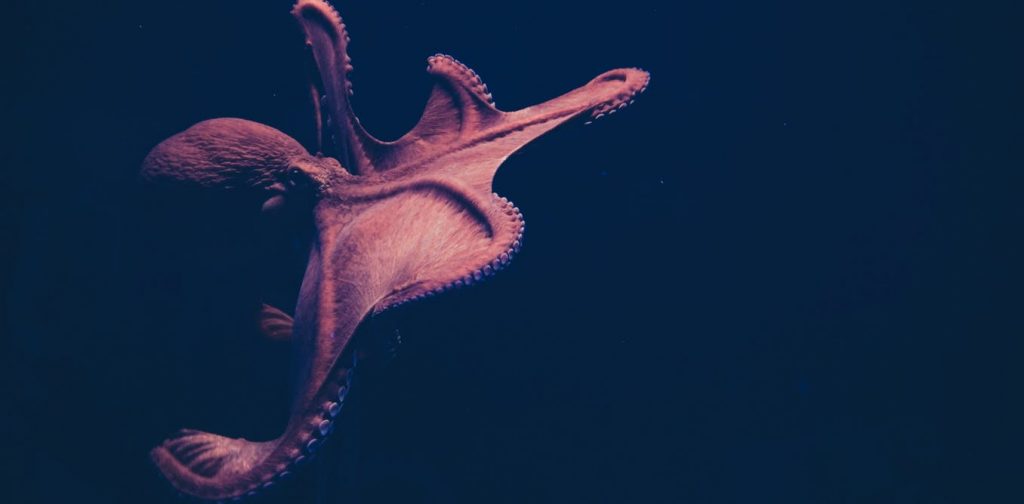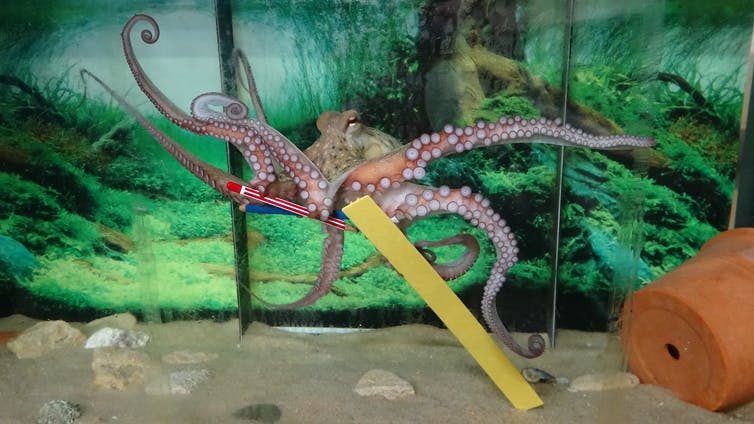
The intelligence of the wonderful octopus
While it just won the Academy Award for Best Documentary “Wisdom of the octopus”The intelligence of these strange animals is fascinating more and more. How does such a special being perceive the world? Very lucky is someone who can say that for sure.
Octopuses, or octopuses, in Victor Hugo’s language, are cephalopods, which are a class of marine animals that are part of mollusks. Equipped with eight arms covered with suction cups and a muscular body without bones or shells, endemic to our oceans. About 200 species are distributed in all marine waters of the world. While our last common ancestor goes back with them to 500 million yearsWhen we study them, they present to us disturbing parallels, through their eyes that stabilize us, their brains running surprisingly close to ours or their curiosity and desire for exploration which reminds us of our thirst for knowledge. Studying these similarities, which we call evolutionary convergence, allows us to better understand how environment and evolution are shaped similarly to organs and behaviors.
On this last point, octopus behavior appears to indicate an impressive intelligence. In ethics, the science of studying behavior, we study this intelligence, which we rather call perception. Cognitive capabilities can be defined as the processes by which information from the environment is perceived, processed, transformed and retained and then used for decision-making and action.
From a behavioral point of view, the flexibility with which individuals adapt their behavior to new and new situations is a good measure of their cognitive abilities. Several studies Octopuses show great flexibility in their behavior, both in their natural habitat and in a laboratory fish tank.
Talented to attack and defend
Let us first consider the example of defense mechanisms in octopuses. In the face of their multiple predators, octopuses are camouflage, as they can simulate their environment by changing the color and texture of their skin instantly and in a variety of ways, thanks to the pigmented cells called chromosomes and the multiple muscles that cover their skin.
Without a shell, octopuses are very vulnerable and will seek to hide, preferably in a cavity shelter under a rock: Octopuses arrange and maintain shelter by removing sand and adding stones and shells to best seal the entrance. Others prefer to hide in silt, or cover themselves with shells, and some will even carry shelter in their arms, a behavior considered to be a use of a tool. This is the case with Coconut octopus, Who was seen carrying half of the coconut shell to hide under it at the slightest danger.
Octopuses themselves are formidable predators, and their attack mechanisms adapt to a wide range of prey that they consume, i.e. all kinds of shellfish and crustaceans, as well as fish and even other cephalopods. They can use their vision and camouflage to hunt, or use their arms to explore, touch, taste and grab any food within range. They can preserve interactions between species for Hunting and cooperating with some fish, Especially grouper, to find hidden prey. They learn to watch out for crabs that carry stinging anemones and attack them cautiously without stinging.
When eating oysters and mollusks, octopuses can either force open the shell, and perhaps slip a small pebble to prevent closure, or inject a paralytic toxin that allows the shell to open easily. The toxin is pollinated In a very specific muscle after drilling the shell, the octopus must learn and remember where each shell is drilled.
Creatures watch closely in the laboratory
The cognitive abilities of octopuses have also been extensively studied in the laboratory. For example, in our EthoS lab, we are currently working on the memory and mapping capabilities of the common octopus. They are complex animals to study, especially because of their great strength, because they can easily destroy the search devices: Beware of submerged cameras, they are able to open waterproof bags to bypass them! In addition, it is devoid of bone, and it can easily escape through the smallest hole; Endlessly curious, they grab hands and landing nets at the slightest maintenance of their aquarium.

Lisa BunsetAnd the Author provided
Opening jars, although impressive and often used to demonstrate the intelligence of octopuses, are not the most exceptional ability. This task is easy for them thanks to their grasping dexterity and ability, but in the end, octopuses are very slow to do the job: even if the octopus is overtrained, it always takes more than a minute to open the pot and grab the crab. However, octopuses remain gifted in the way they handle things, for example by adjusting their orientation in relation to them. Slide through a small hole in the wall.
They also excel at discriminatory learning: When faced with two things, they learn to attack an object in exchange for a reward, based on its characteristics, such as color, shape, texture, or taste. They can hold this learning for several months, and they are Able to generalize, A complex task that requires automatically expanding the learner base to include new objects based on their similarities (size, color, and roughness) with those they encountered previously. For example, after octopuses have learned to recognize and attack a real ball, they can reproduce that learning on screen, and so on.Virtual attacking ball.
They show conditional discrimination, that is, they can adjust their choice according to context: for example, they can learn to attack an object only in the presence of bubbles in their environment and Refrain from attacking in their absence. They are able to learn spatial, and You may find an invisible shelter Remembers its position in space. They too can Use visual cues To see how to point their arm at a darker device.
Finally, octopuses are able to learn by means of Monitor colleagues. This is surprising, since they are animals that are described as being mostly solitary (although octopus communities are observed occasionally). However, after observing a symmetrical person choosing a specific object, an octopus is able to reproduce this behavior without further learning. But while they are impressive in what they learned in the laboratory, octopuses remain surprisingly irregular animals in their responses, especially in visual discrimination experiments, where they rarely perform beyond 80% of success when other animals do their job almost perfectly.
Thus, if we take the definition of intelligence, we note that octopuses validate all conditions: they show great flexibility in obtaining information (use of several senses, social learning) in processing this information (discriminatory and conditional learning), in retention (long-term memory), And in their use (adaptation of behavior in the face of various predators and prey).
But don’t get me wrong: just because they’re the center of attention doesn’t mean they’re our smartest seas! In the cephalopod school yard, the octopus prefers to be the troubled student. Squid is preferred to be the first of its kind. These octopus cousins have been surprisingly ignored by the general public, yet they are at the center of much research in behavioral science laboratories around the world: fewer of all professions than octopuses, and yet they have unparalleled educational capabilities. To learn complex grammar in a very short time, and once you have it, apply them perfectly.
Finally, cephalopods show us that it is not necessary to search for intelligent life forms in the stars, because there is still a lot to discover in our seas!

“Organizer. Social media geek. General communicator. Bacon scholar. Proud pop culture trailblazer.”
